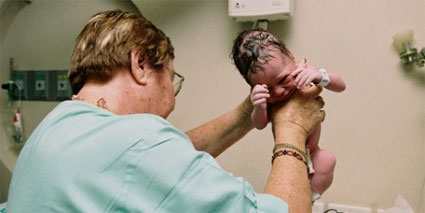When a normal or a low risk pregnancy is overdue or is past 42 week, doctors usually prefer to induce the labour. Read on to learn more about induction of labour.The technique of artificially starting the labour is known as induction of labour. Labour is usually induced when the baby is overdue. In case of induced labour, delivery takes places through the vagina. Let us take a look in detail at what is induction of labour and under what circumstances is labour induced in pregnant women.
What is induction of labour?
In most cases, doctors normally let nature take its course (wait for labour to begin naturally). But in 1 out of 3 cases, a doctor might need to intervene due to certain complications (see below). He has 2 choices - inducing labour or performing a
caesarean section. In case he has the luxury of time, and both the mother and baby can bear the stress of labour, induction is the preferred option. Induction of
labour is a procedure where labour is induced artificially in the mother. The
delivery will still be through the vagina, and the woman will go through all three stages of labour. This option is generally preferred over caesarean because it is as close to a normal vaginal delivery, as possible.
Under what situations does a doctor consider inducing labour?
Induction of labour is necessary when:
- Labour is weak or has stopped all of a sudden
- A pregnancy is a couple of weeks past its due date
- The placenta is not functioning and the uterine environment can no longer sustain the little one
- The water breaks, but is not followed by contractions, and the risk of infection rises
- The mother is suffering from diabetes, high blood pressure, kidney problems, pre-eclampsia or any such condition that threatens her well-being or that of the foetus
- The foetus is not thriving due to poor nutrition, post maturity, etc. and can survive outside the environs of the uterus
How is labour induced?
There are basically 3 ways to induce labour. The simplest method is the insertion of Prostaglandin pessaries into the vagina to cause the uterus to go into labour.
The most common method is the artificial rupturing of membranes (ARM) that surround the foetus. If the cervix is not ripe and ready, pain relief medication is administered and Prostaglandin E2 suppositories (hormones that cause natural labour) or gel could be applied too. The mother might be given a dose of mineral oil or asked to stimulate her nipples to start off the contractions.
But in some cases, oxytocin, which is a hormone produced by the pituitary gland during pregnancy, has to be administered externally to activate the uterus. This hormone is released when the nipples are stimulated, causing the uterus to contract and is considered a trigger for normal labour.
What if labour induction techniques do not work?
Depending upon the health conditions of a mother, doctors first prefer to have normal vaginal delivery by inducing the labour. If the labour induction does not work within the first few attempts, c-section or caesarean section is usually preferred by doctors.
What are the side effects of labour induction?
Although, labour induction techniques can be carried out on pregnant women having low risk pregnancy safely, complications may arise sometimes. Have quick look at some side effects of labour induction.
- Mother or baby or both may become susceptible to infection.
- Change in the baby’s heart rate can be caused as a result of the quick contraction of uterus caused due induction of labour.
- In first-time mothers labour induction may not work and c-section may be needed.
- In rare cases it may cause complications like uterine rupture.
- It can cause umbilical cord problems and affect the oxygen supply to the baby.
- If the uterine muscles do not contract properly after the induction of labour, it can cause excessive bleeding after delivery.
Labour induction may not be an option if you are coping with placenta previa or infections like genital herpes. It may also be not suitable for you if your birth canal is very small or if you have undergone a classical caesarean section or major surgery on your uterus. Labour induction is usually carried out on low risk pregnancies. If your doctor decides to induce your labour, he or she will monitor you as well as your baby closely so that the risks are prevented. So, there is no need to worry.































